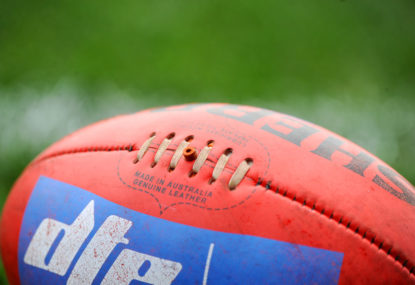Footy Fix: The Cats are inevitable - and they're smarter, clutcher, quicker, and scarier than ever
"I am inevitable" - Thanos, Avengers: Endgame You know that scene at the end of a horror movie where everyone thinks the killer is…

Is generating clicks and aggravating talk back callers what footy broadcasting has come to? Does quality content no longer matter?
It sure feels like it to me.
Gone are the days where reporters simply reported. The football media today is unrecognisable. Its heavily diluted form resembles nothing of days gone by.
What seems strange to me is, in the online world in which we live and with articles hidden behind paywalls, the standard of content can be so appallingly low. However, it is the method of obtaining content that is most worrisome.
The internet and the explosion of social media has seen outlets, whether it be print, television or radio, throwing their standards out the window.
It’s understandable that the internet has changed our habits and hampered sales of the traditional newspaper, but surely paywalls can only be justified by content actually worth paying for.
AFL footy journos and former footballers masquerading as them have contributed to reducing what was once a credible vocation into one where credibility and integrity are merely byproducts.
It would be unfair of me to paint them all with the same brush as there are still some who are well researched, unbiased, fair and honest.
Sadly though, the majority of those who provide us with the footy news we crave are shock jock types more intent on making a name for themselves through ridicule.
Social media has played an undeniable role in the substandard quality of footy reporting. Its instantaneous nature has brought about a pressure for content never seen before.
Information sharing in years gone by was delayed and expected. Articles written, re-written, submitted and edited before being printed for distribution up to 24 hours later.
With the internet, this is all but extinct as consumers now reside in a world where the information they receive reaches them almost faster than the journos can actually write it.
Immediate content that can be posted in an instant has seen journalistic standards slip to infuriatingly unsatisfactory levels.
Footy journos are under so much pressure from employers to provide daily content that they will simply say or post anything to gain attention and justify their positions.
But for this to be successful, the public must be involved for it is them who provide the 24-hour news services the content they desperately seek.
In footy, there are clubs and players the media consider ‘easy targets’. They are the ones whose vulnerability is judged based on performance and ladder position. These are the ones who generate content. They are prey and an easy kill.
Footy shock jocks and journos simply throw grenades knowing that is all it takes to antagonise and provoke long-suffering fans who, as if on cue, will smash social media and flood talkback lines to voice their disapproval.
All while the culprits and their employers pat each other on the back for a job well done. Just throw the bomb and let the fans loose.
One prominent former Port Adelaide footballer-cum-journo or radio jock – I’m not really sure what he is – deliberately antagonises footy fans on Twitter with the sole intent of return fire.
This, to create content for a segment on his radio show called Mean Tweets where, with contempt, he further humiliates respondents by reading their tweets on air for a laugh.
Embarrassing.
Social media in the reporting of footy is fast, cheap and above all, it’s easy. Journos don’t have to work that hard anymore and they know it. What’s reported is often not newsworthy, almost only opinion based, where no research has been done at all and where mockery has become the norm.
Well, for the rank and file of which I am very much a part, there really is only one very simple solution.
Ever seen signs telling you not to feed the wildlife? Once they learn where the food comes from, they never go away.
Stop feeding them. It might just work.